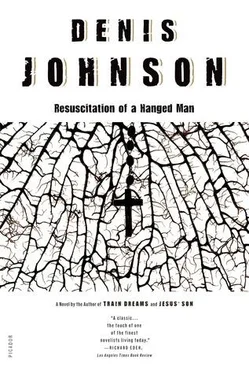“I’d buy anything, if the price was right. I’ve bought more horrible things than that. And sold them again.”
“What do you mean, horrible? It gets me everywhere.”
Howardsen let English hold his suede coat while he walked a circle around the vehicle in a kind of half crouch. He took back the coat and stood still and regarded the car for another few seconds, managing to seem both meditative and astonished. Then he spoke: “I mean, starting from the ground up, the tires have about four hundred miles of tread left. If that. These old VWs, the heater’s not powerful enough for our winters. That’s okay, I’ll sell it in the summer.” He stepped to the rear to raise the hood on English’s horrible engine. “These things start to run kind of dirty after a while. You get a kind of chugging action, sort of? Quits chugging after you get her on the open highway for a while? That’s the valves burning off the crud after you get the rpms up. Crud collects,” he said, “driving at low rpms around town. If you’re hysterically desperate for cash, like two hundred and fifty dollars, I could give you that much.” He dropped the hood. “Hood don’t fall right,” he said, shutting it a second time. “Did you have a little wreck maybe?” One last time he lifted and dropped the bonnet, letting that put a period to the sad catalogue.
“I’m kind of insulted.”
“But fairly desperate.”
“Three-fifty?” English said.
Howardsen plucked a roll of money from under his baseball cap and peeled off three one-hundred-dollar bills. “I have some papers for you to sign,” he said. “Also, I’ve got a four-wheel drive you can rent.”
As English was driving out of the place in an open jeep, he stopped and called Howardsen over to try, one last time, to get the man to let him keep a little of his money. “You could live without one of those hundreds, I’d think.”
“What would you spend it on in the woods?” Howardsen asked. “It’s better all around if I keep it till we have the jeep back. If you had a major credit card it’d be another matter.”
English saluted and engaged the clutch, and as he did so Howardsen raised a warning finger: “Beware the Sasquatch.”
English now recognized this man as a messenger.
“You’ll know the Sasquatch. He looks kind of like Señor Mister Vance over there across the street, who you were talking to.”
A sour feeling of dread stroked English under his throat. “Are you saying,” English asked, “that he might follow me out there?”
The man winced. “You’re lacking a sense of humor,” he told English. “Maybe I shouldn’t kid with you.”
“Should I be taking a weapon?” English asked carefully.
“There’s nothing in season now,” Howardsen said, and looked so uncomfortable that English realized, a little too late, that he’d made a sort of crazy mistake. He didn’t know what to do, other than gun the engine and drive off before the man could ask for his jeep back.
Road 18 crossed a railway track, travelled for a few miles alongside it, and then headed up the mountain in a series of narrow switchbacks, crossing a small creek repeatedly. The road wasn’t icy here, but English heard what he thought must be ice thumping, sometimes splashing down into the creek, the water wearing its groove over eons while people built their churches and laid out their railroads in a geological eye blink. For a while the dread dissolved, the feeling that he was launched on a fatal errand left him, and he forgot he was here without any good reason but with complete certainty. It was nice to be out in the country in May, when the rivers were young.
His machine shimmied somewhat in the particularly muddy patches, but even in the steepest places its climb was happy and relentless, and wherever the road forded the creek English plowed into it without bothering the brakes and charged across like Moses, turning great furrows of water on either side of him. He was elated. Whenever the road switched back south in its upward zigzag, the roof of trees opened up and he glimpsed, high above him, a promontory with a slender falls coming down over it like a white cowlick. This gnarled outcropping seemed to form the head of a cliff that had pushed up out of prehistory to block the region from the southern sun; ten miles up the road English came into its shadow.
Here the thaw was late, the mud of the road was firm, and he crossed inexplicable stretches of pure winter, with the lane and the evergreens immersed in a silent whiteness.
The jeep’s big tires travelled the snows without any trouble, but when they found slush beneath them they seemed to forget completely the purpose of their manufacture, and English’s ride began behaving less like an all-terrain vehicle than like a merry-go-round. He was, he had to admit, spinning out of control and leaving the road.
Now he was stopped, facing the direction from which he’d come and tilted leftward to such a degree he had the sickly suspicion that at least two of his wheels might not be on the ground. He put the thing in reverse, engaging also a certain mechanism of the mind by which he found it possible to pretend that he couldn’t by any means have got himself stuck in a rut miles and miles from any human place and at the same time to spin the tires and rock the car and whip the steering from side to side, installing the jeep permanently right where it was. He got out and put his back against the grille and his feet against a tree and pushed until satisfied he was dealing with an inert mass. He turned his back on it and took to the road again. He had to walk, and his shoes, while fine for walking, were no good in the snow; but his elation remained. He was happy to see the empowering things of man flounder sideways into their natural uselessness.
He walked carefully at the margin of the road, seeking the crustier surfaces and only occasionally plunging himself to the knees in old snow that was more like crushed ice. In many places the thaw was complete, and he trudged through mud. The slope gentled. The bluff and the long waterfall down the face of it now took up a good part of the sky. He expected to hit the wall of the cliff somewhere up ahead. The temperature was more than bearable, and in fact in his leather jacket he was far too warm. There was no question however of laying it aside, of shedding his image, his crest, his coat of arms. Even Joan of Arc had had her breastplate, anyway she did in the paintings he’d seen of her, and Simone Well — who knew what she had, beyond her silly delusions. But isn’t it a question of following it out anyway? Isn’t that where faith comes in? Didn’t Joan of Arc admit the voice of God was in her imagination? Isn’t it a matter of faith marching after the delusion? Isn’t that what the saints are proving?
He’d come to a gate and a sign. He couldn’t have walked much more than a mile.
The Forest Service sign informed him that the structures in the encampment were considered antique. Tampering and destruction were barred by federal law and would be punished.
The campground lay beyond the gate — which kept out only vehicles; a footpath went around it — in a large hollow wide enough to be called a meadow. The sun apparently never got to it, and most of the winter’s snow lay around in big patches. Among the antique structures referred to by the sign there was, of all things, an antique feedlot — for what kind of livestock he couldn’t imagine. Maybe farmers had once driven their sheep up here for the summer grasses. There were half a dozen one-room cabins painted white. To English they didn’t look so old. One after another he found them locked and undisturbed. From the roof of one a sheet of snow had slid halfway off, curving down but not breaking, lengthening the eave by nearly three feet, and then melting irregularly like paraffin.
Читать дальше












